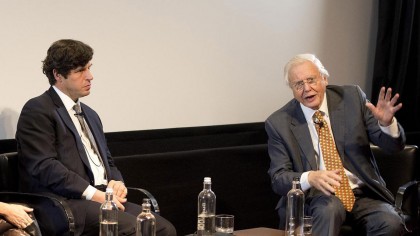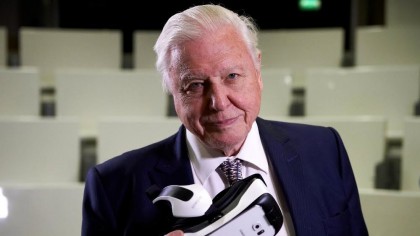Geffen: 'Amazing' VR will suffer from a quality content drought
The potential is massive, but we're going to tire quickly of static 360 vids

When it comes to the cutting-edge of television, Anthony Geffen and Atlantic Productions have a claim to be among the keenest, and it is virtual reality that is currently stirring their interest.
Perhaps best known for their collaboration with iconic broadcaster and natural historian Sir David Attenborough, Atlantic have produced some of the most critically acclaimed 3D and IMAX documentaries ever made.
In December last year, its VR studio Alchemy went one step further and produced a VR-ready deep dive - again featuring Attenborough - that took visitors to the world famous Natural History museum in London as close as many of them will ever get to being in a submarine investigating the Great Barrier Reef.

Geffen is a passionate advocate for pushing the envelope in storytelling, palpably excited by the prospects of creating stories in an immersive environment, and with a firm grasp of the issues and bumps ahead in a journey just started.
"We've been interested in VR for a long time, he told techradar. "When it hits the sweet spot it's completely different from anything else and so immersive. It's very exciting.
"The problems that people face are that it is very expensive at the moment but probably the next issue will be that currently [film-makers] are going somewhere, filming with 360 cameras stitching the footage together and just churning it out.
"The first time you let people stand in Piccadilly Circus is sometimes amazing, but you can stand there in real life and it's not a story that people will keep going back to. People will get fed up quite quickly
Get daily insight, inspiration and deals in your inbox
Sign up for breaking news, reviews, opinion, top tech deals, and more.
"And with the public now getting cheap access to VR headsets - like Samsung giving away the Gear VR with its phones etc - what we're not getting fast enough is a lot of powerful VR experiences that will make people think 'Wow this is a great new medium'. That's quite dangerous.
"There are a few amazingly good films but not enough that people will truly engage with."
Geffen believes that mobile phones have proven to be the revolutionary arrival for VR, but the computational power of the likes of Oculus Rift and HTC Vive are kindling a more powerful experience.

"The tethered Vive and Rift we are building stuff for too. They can deal with a lot of data, very rich real-time graphics rendering. We're building something to do with the ancient world and the pyramids, you can go inside and move around in real time and it's amazing stuff.
"But that's like shooting a full movie - and how are we going to get that financed going forward?"
VR has, of course, already been through the boom and bust of hype in the 80s, and Geffen admits it remains "dangerous" as an industry despite its obvious attractions. "Half of me predicts the curve will happen in a different way [to the last VR arrival], there isn't the content at the moment but everybody is feeling really good about VR.
"The downturn will come in about September and I think this is a massive problem. Manufacturers should have supported content, but budgets were cut. I think the big providers - the likes of Google - have realised they have made a bit of a mistake and they are now coming to the likes of us for content.

"It's classic for the big manufacturers to launch with second rate content after failing to support the creators. Oculus has a home store with nothing significant to support it.
"We're lucky to have other properly backed productions. Even Google are slow to back content but somebody needs to."
Patrick Goss is the ex-Editor in Chief of TechRadar. Patrick was a passionate and experienced journalist, and he has been lucky enough to work on some of the finest online properties on the planet, building audiences everywhere and establishing himself at the forefront of digital content. After a long stint as the boss at TechRadar, Patrick has now moved on to a role with Apple, where he is the Managing Editor for the App Store in the UK.
